Dr. O was an opinionated, no-nonsense physician whose motto at work and at home was: “It’s my way or the highway”. His attitude had won him few friends and alienated his colleagues. Despite his brashness, he’d been acknowledged as one of the finest surgeons in the country until a recent skiing accident damaged his wrists and left him incapable of operating. All the specialist told him the damage couldn’t be repaired.
He reluctantly agreed to see me at the insistence of his wife, a regular client of mine who was a doctor of non-traditional medicine. She had long complained about her husband’s stubborn closed-mindedness and unwillingness to try new things. Since the accident, she’d pleaded with him constantly to seek alternative therapy for his injuries and to help his overall outlook. He steadfastly refused and the marriage was quickly deteriorating.
“My wife says I’ve become bitter and mean-spirited,” he complained. “What does she expect? I can’t work, I can’t even hold a scalpel—my career is over.”
Dr. O’s handprints revealed why he was an excellent surgeon. His long, unbending head line stretched into the hand’s great energy center of Mars positive, giving him the drive, strength of mind and cool nerves to perform with grace under pressure. And his passion and dedication were evident in his strong destiny line, but the destiny line ended abruptly at his head line, confirming the sudden break in his career.
A destiny line ending at the head line indicates there is something wrong with our way of thinking, which disrupts our destiny—our purpose in life. When the head line is properly used, we think constructively and our destiny will continue uninterrupted regardless of mishap or setback. A destiny-head line disruption can be a staggering blow to our self-confidence and sense of identity, as well as damaging our personal relationships and financial well-being.
I suspected the rigidity of Dr. O’s head line had interfered with his destiny—his inflexible thinking fully manifested following the stress of his accident, sending him into a downward spiral. Fortunately, there were two potentially helpful features in Dr. O’s handprints. Foremost was a second, overlapping destiny line above the head line suggesting that, after a period of self-reflection and the adoption of a more positive attitude, Dr. O was capable of continuing his career. Secondly, a square on the original destiny line where it broke at the headline meant he had to ability to be receptive to new ideas and to accept the support and advice of friends and family. I was certain that successfully guiding him in this direction would improve his situation.
“Dr. O, your wife has urged you to see an alternative practitioner. . . why not swallow your pride and take her advice? Look at it this way: You have nothing to lose and everything to gain.”
Thankfully, Dr. O took my recommendation. He began an alternative therapy program and adhered to it religiously. One year later he returned to my office.
“Great news, Ghanshyam! I’ve resumed my hospital duties. My wrists are healed; I’m operating even better than before!” he told me. Even better, he said, he was making friends for the first time—his colleagues loved his new-found openness to their ideas.
“The only person happier than I am is my wife,” Dr. O smiled. “She keeps asking me what I did with her husband!”
Do you need guidance to re-establish your priorities or sense of purpose? Give us a call at 866-428-3799, or click here to book a consultation. We’re here to help.


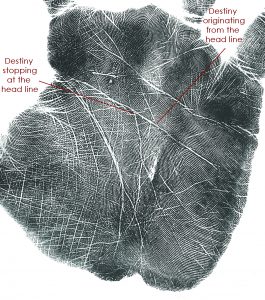

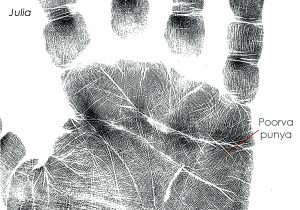
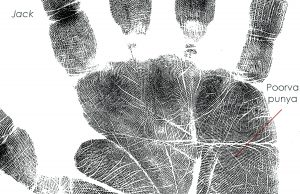

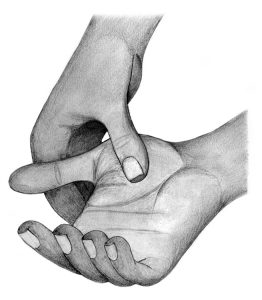
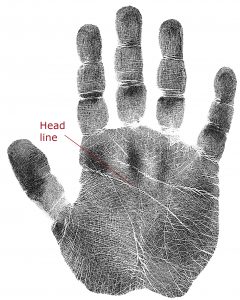
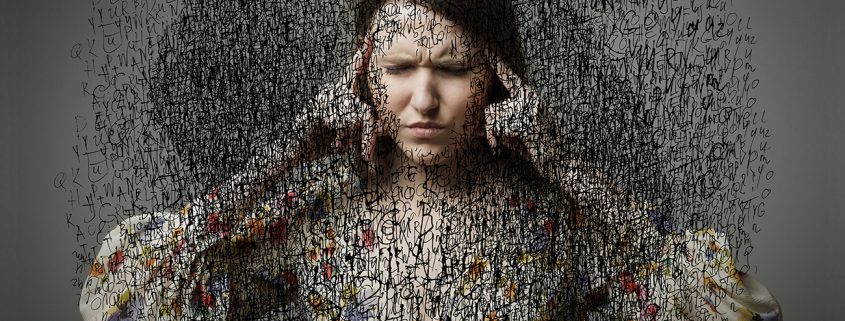
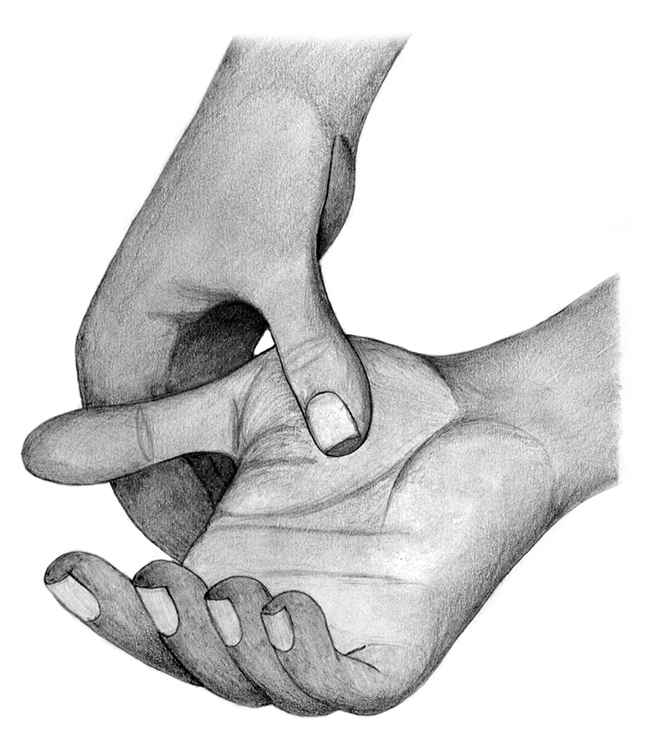
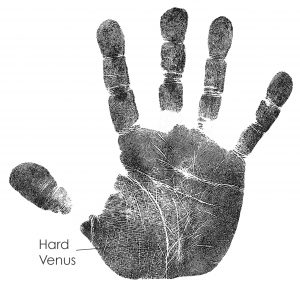

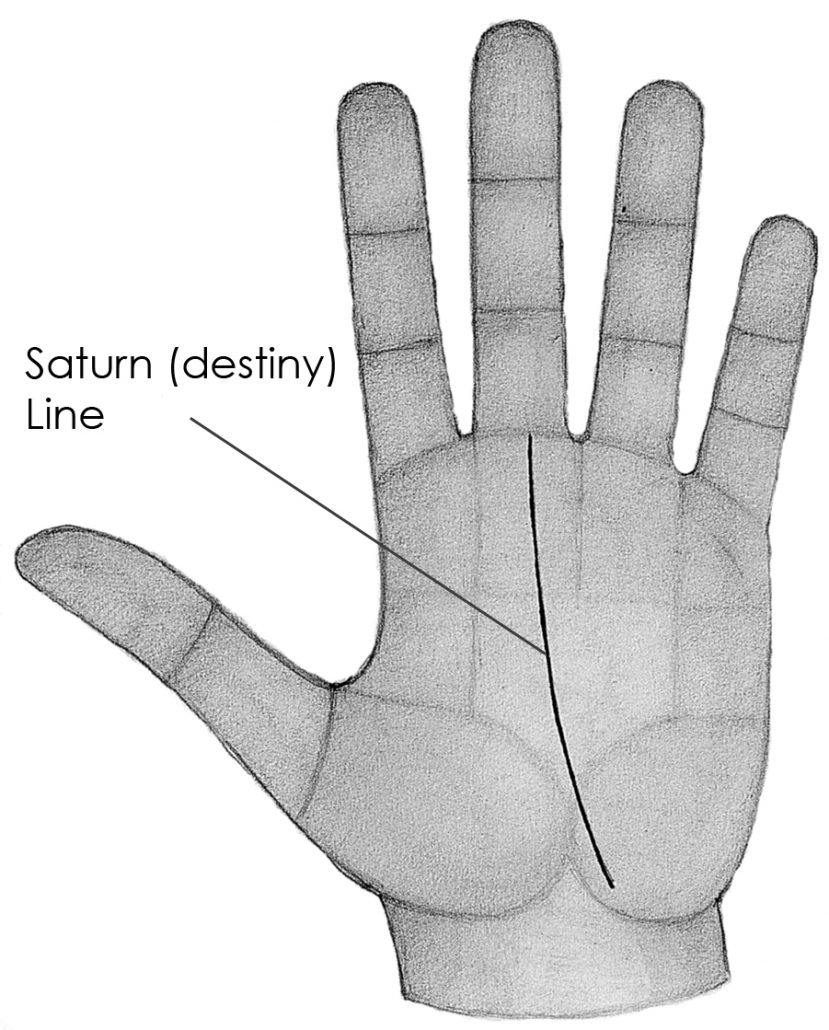 In palmistry, the Saturn line—also known as the line of destiny—is a good indicator of our depth of purpose.
In palmistry, the Saturn line—also known as the line of destiny—is a good indicator of our depth of purpose.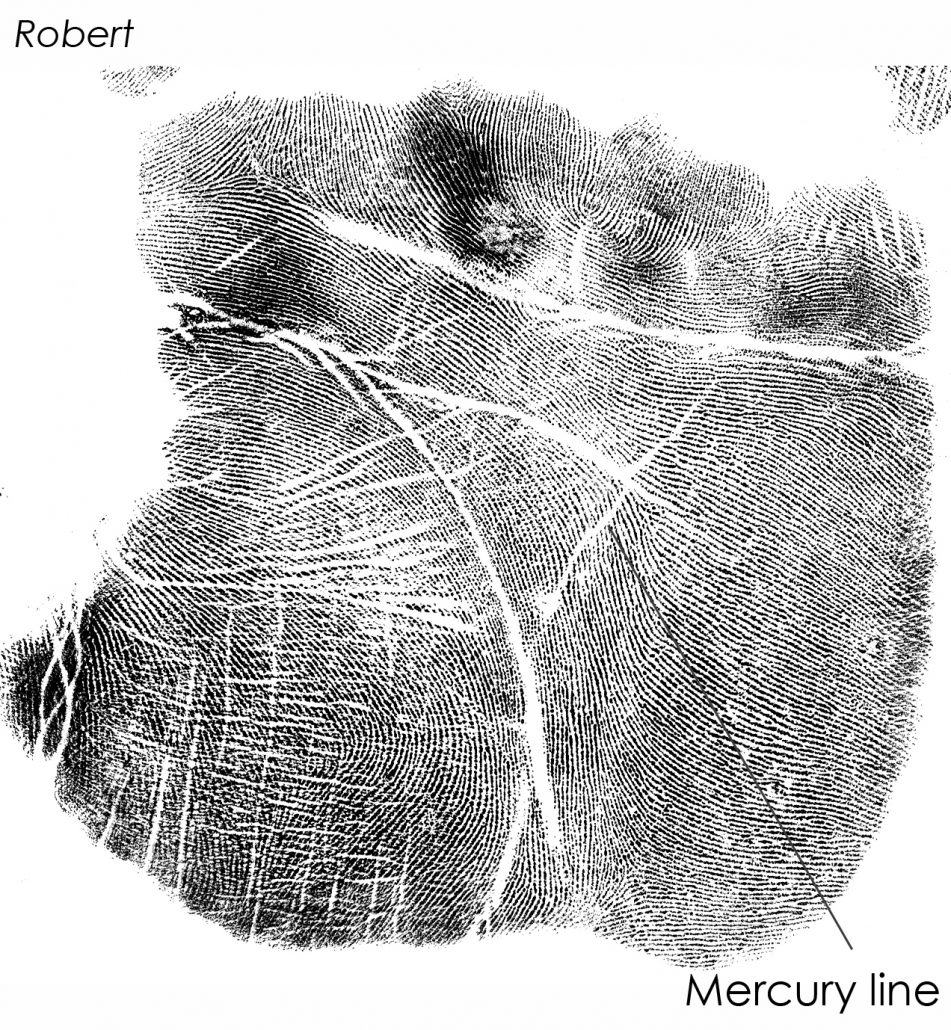 deep-seated purpose. So he had an education, but no calling . . . and he wasn’t searching for one. He passed his time earning rent money, watching television, and becoming more and more depressed. With no hobbies, passions, causes or supportive friends to encourage or challenge him to set his sights higher and strive for excellence, Robert fell into a mechanical routine of daily survival, leaving him restless, bored and completely unfulfilled.
deep-seated purpose. So he had an education, but no calling . . . and he wasn’t searching for one. He passed his time earning rent money, watching television, and becoming more and more depressed. With no hobbies, passions, causes or supportive friends to encourage or challenge him to set his sights higher and strive for excellence, Robert fell into a mechanical routine of daily survival, leaving him restless, bored and completely unfulfilled.
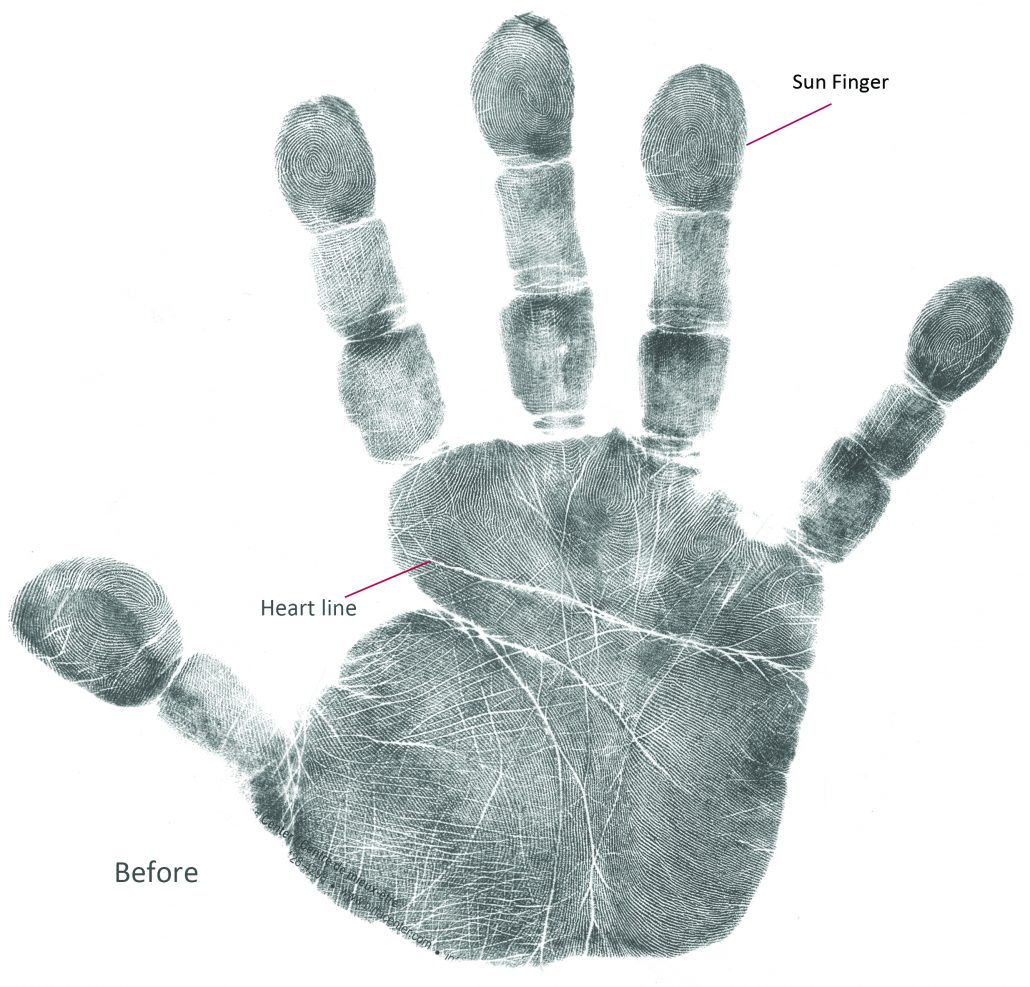 Steve’s handprints confirmed what he was telling me. His heart line was particularly revealing—it was long and as straight as a ruler. While the line’s length suggested he was idealistic and capable of loving deeply, its rigidity rendered him incapable of compromising or accepting others for who they truly were. He became agitated when people didn’t see things his way, which made him intense and unyielding—a bad combination if he hoped to maintain a long-term, harmonious relationship. He simply couldn’t respond to the needs and feelings of his partner. His unhappy situation was made all the worse by his closed Sun finger, which drained him of his natural magnetism and prevented him from experiencing joy in life and love.
Steve’s handprints confirmed what he was telling me. His heart line was particularly revealing—it was long and as straight as a ruler. While the line’s length suggested he was idealistic and capable of loving deeply, its rigidity rendered him incapable of compromising or accepting others for who they truly were. He became agitated when people didn’t see things his way, which made him intense and unyielding—a bad combination if he hoped to maintain a long-term, harmonious relationship. He simply couldn’t respond to the needs and feelings of his partner. His unhappy situation was made all the worse by his closed Sun finger, which drained him of his natural magnetism and prevented him from experiencing joy in life and love.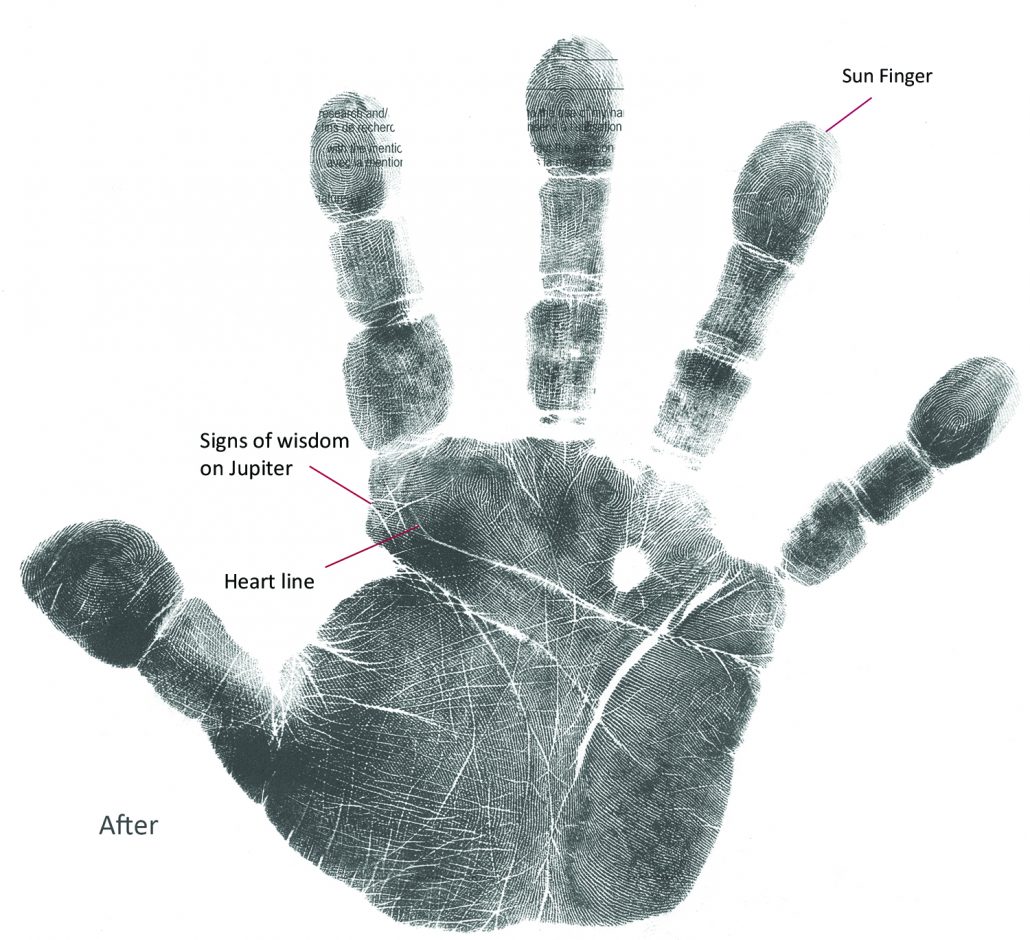
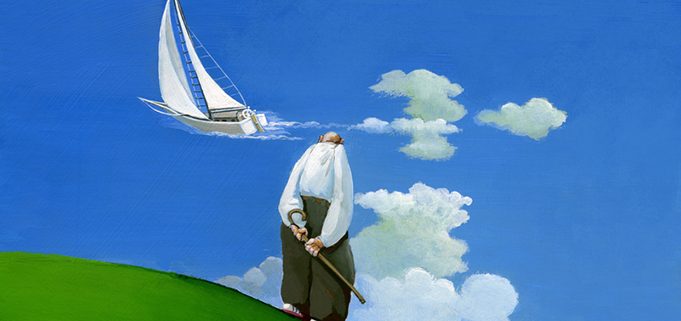
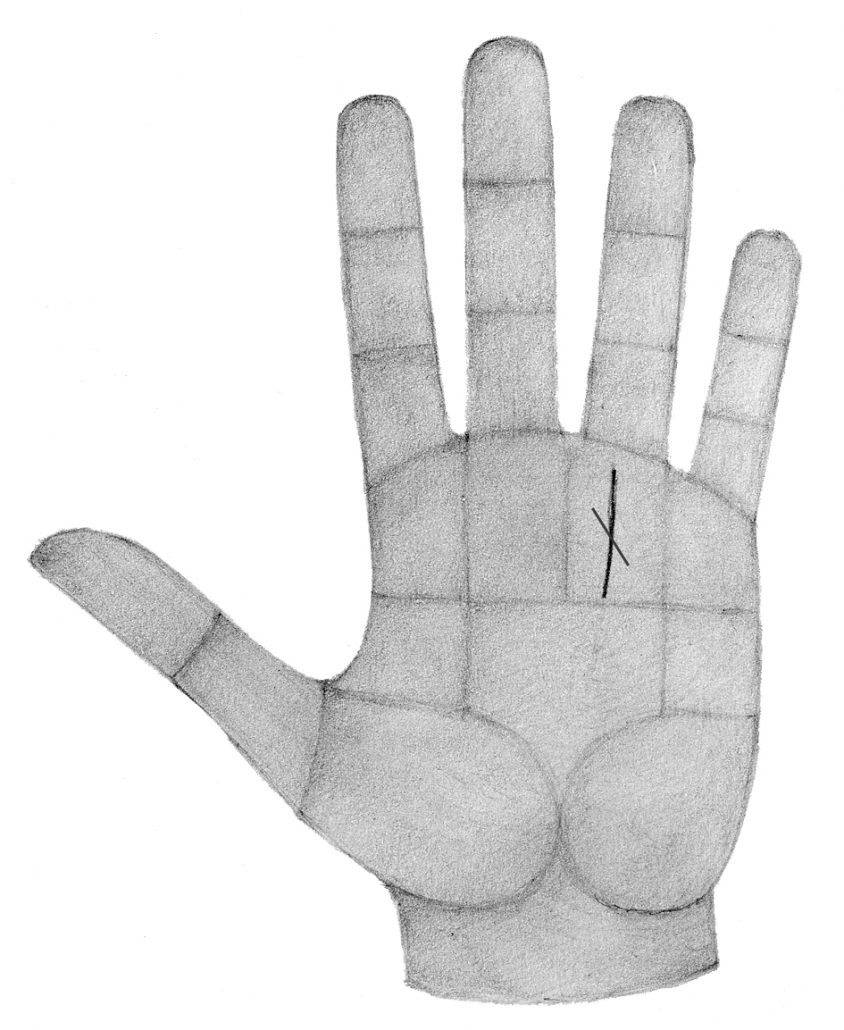 “The lines and signs of the hand form a complex and integral web—they should be read as a whole,” I said. “But what stands out most in your palm is the cross on your Sun line. The Sun line is an expression of personal joy, success and contentment—if it’s healthy and solid, it means you’re following your heart selflessly and without the need of praise or approval. However, this cross is cutting your Sun line in half. The cross has likely been caused by some unconscious or external force that’s interfering with your ability to decide or act upon what your heart is intuitively telling you is the right thing to do. Have you had difficulty finding or keeping the things that give you joy? Do you have trouble committing to your passion or happiness?”
“The lines and signs of the hand form a complex and integral web—they should be read as a whole,” I said. “But what stands out most in your palm is the cross on your Sun line. The Sun line is an expression of personal joy, success and contentment—if it’s healthy and solid, it means you’re following your heart selflessly and without the need of praise or approval. However, this cross is cutting your Sun line in half. The cross has likely been caused by some unconscious or external force that’s interfering with your ability to decide or act upon what your heart is intuitively telling you is the right thing to do. Have you had difficulty finding or keeping the things that give you joy? Do you have trouble committing to your passion or happiness?”
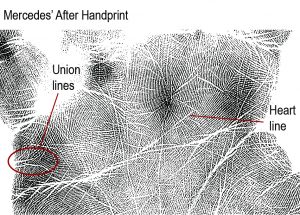 I compared Mercedes’s current handprints with the ones from the year before and saw that her heart line hadn’t changed in either her right hand (reflecting her conscious mind because she was right-handed) or in her left hand, relating to her subconscious. This meant her affection for Mateo had remained constant. However, a series of lines paralleling her union (marriage) line had formed in her subconscious hand and the union line itself was now turning downward. These were clear indications of a growing emotional separation from Mateo, which could soon lead to an actually separation.
I compared Mercedes’s current handprints with the ones from the year before and saw that her heart line hadn’t changed in either her right hand (reflecting her conscious mind because she was right-handed) or in her left hand, relating to her subconscious. This meant her affection for Mateo had remained constant. However, a series of lines paralleling her union (marriage) line had formed in her subconscious hand and the union line itself was now turning downward. These were clear indications of a growing emotional separation from Mateo, which could soon lead to an actually separation.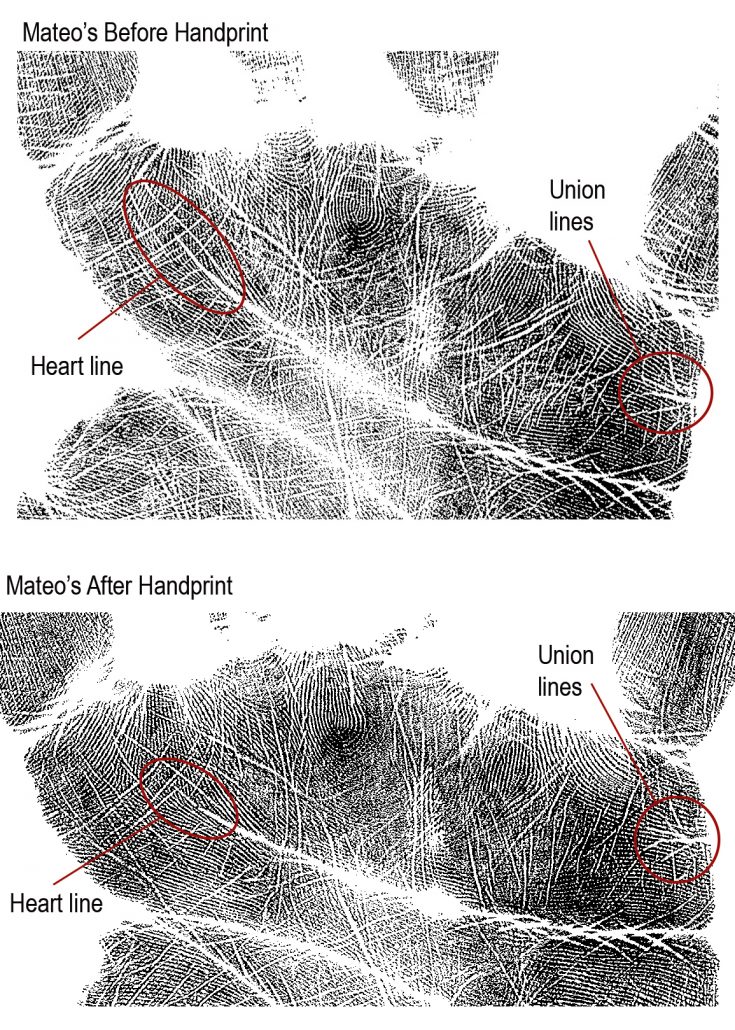 Mateo’s handprints from a year ago revealed a multitude of parallel union lines in both hands, and those lines were just as pronounced in the new prints. Most worrisome was that the long, solid heart line from the previous year originating in his idealistic Jupiter mount had changed in the new handprints—it had shrunk and was now broken in two.
Mateo’s handprints from a year ago revealed a multitude of parallel union lines in both hands, and those lines were just as pronounced in the new prints. Most worrisome was that the long, solid heart line from the previous year originating in his idealistic Jupiter mount had changed in the new handprints—it had shrunk and was now broken in two.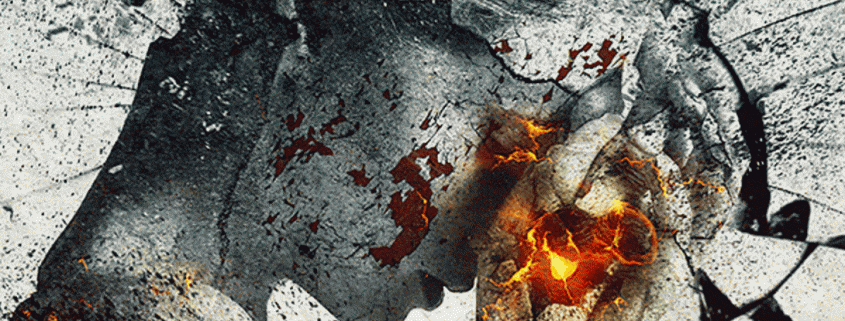
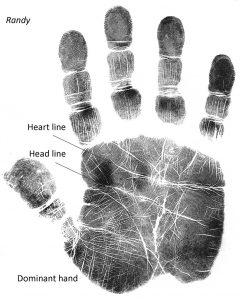
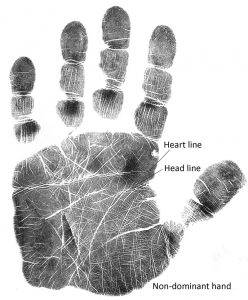
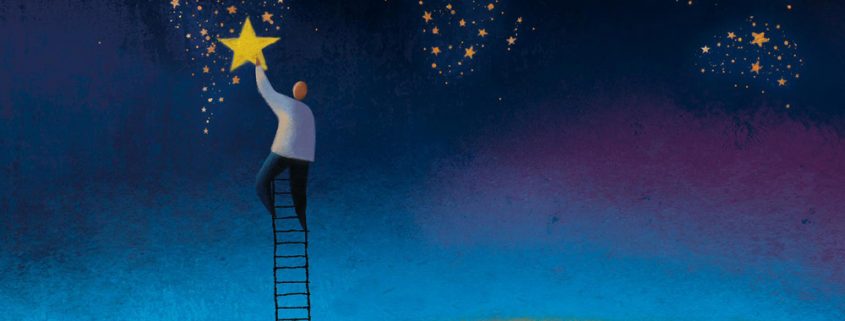
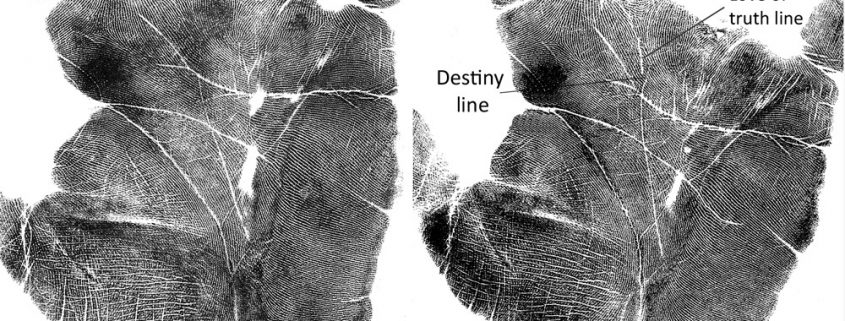
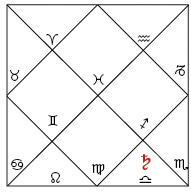 discipline and discernment to rigorously seek the truth. With this auspicious planetary configuration, Phillip could excel in any career calling for analytic investigation, such as a theoretical scientist, investigative journalist, psychologist, palmist or astrologer.
discipline and discernment to rigorously seek the truth. With this auspicious planetary configuration, Phillip could excel in any career calling for analytic investigation, such as a theoretical scientist, investigative journalist, psychologist, palmist or astrologer.